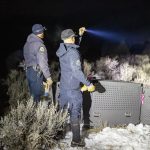Eagle officials concede ethics violation, avoid fines

DENVER — During a formal hearing held Monday before the Colorado Independent Ethics Commission, Eagle Mayor Yuri Kostick and town board member Doug Seabury admitted they violated state of Colorado ethics regulations when they accepted airfare and lodging from Haymeadow developer Alan Cohen last fall.
The commission’s discussion centered around a stipulation agreement that laid out the facts of the October trip and detailed how it was a violation of Amendment 41, which prohibits town officials or staff from accepting gifts, including travel costs, in excess of $50. The complaint filed by Eagle resident Mike Stevens noted that Kostick and Seabury accepted $2,380 airfare, in addition to lodging and food provided by Cohen, during a Florida trip Oct. 29 through Nov. 1. Cohen is the owner and developer of the Haymeadow property in Eagle, a 660-acre parcel located just south of the Eagle Pool and Ice Rink. Haymeadow is approved for an 837-unit residential development.
“Ultimately, there is no dispute of fact,” said Independent Ethics Commission Executive Director Amy Devan.
She noted that the Eagle officials admitted to participating in the trip. “When they returned, they realized it was a violation of Amendment 41.”
“They (voters) want people to have a more restrictive line … in how they are wooed, and are being wooed, from people who have business with the government.”William LeoneChairman, Colorado Independent Ethics Commission
Support Local Journalism
Devan told the commission members that Kostick and Seabury repaid the airfare costs in November of last year and in February, they repaid costs associated with their stay at Cohen’s home.
“I would just like to say I have worked closely with Ms. Devan,” said Kostick, while addressing the commission members Monday. “The story is what it is.”
Kostick said when the issue was first brought to light, he and Seabury received legal advice not to speak about the complaint.
“I have not been able to address the community I serve,” Kostick said. “I haven’t had the opportunity to make things whole in my community and it’s been a distraction. I am looking forward to moving past this.”
Seabury did not attend Monday’s hearing, but he did note that he was available by telephone.
Sympathetic ears
In general, the commission members were sympathetic to the Eagle officials’ claims that they were unaware that what they were doing was wrong when they embarked on the trip. The commission members noted that by agreeing to the stipulated facts, Kostick and Seabury took responsibility for their ethics violations. Additionally, the commission members noted the two men have repaid costs associated with the trip.
“What make these kinds of issues so difficult is it is easy for well-meaning people to rationalize conduct,” said Commission Chairman William Leone.
However, he noted the people of Colorado have said they want clear rules to govern public officials’ actions.
“They (voters) want people to have a more restrictive line … in how they are wooed, and are being wooed, from people who have business with the government,” Leone said.
Commission member Matt Smith applauded Kostick and Seabury’s willingness to admit that the trip was an ethics violation. “But why, in this day and age, would this have happened?” Smith asked. “Why wasn’t this violation understood before the travel ever happened?”
Commission members noted that local governments likely need more education about ethics rules and suggested the commission should “redouble its efforts at outreach.”
The commission did not levy additional fines in the case and noted that by agreeing to the stipulation, Kostick and Seabury admitted what they did was wrong.
“In some instances, that works as well as an admonition would,” Smith said.
The stipulation agreement in the Eagle case is a rarity for the commission. There have only been three stipulation agreements approved by the commission since its formation in 2008. Additionally, a ruling that a case brought before the group is “non frivolous” is a relative rarity. Of the 24 formal complaints filed in 2014, for example, all were dismissed as either frivolous or for a lack of jurisdiction.











